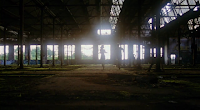Allow me for a moment to be serious...
I know it's cliche, and perhaps even a little cheesy, to type a list of things one is thankful for, but I felt compelled to compile this short post in light of some recent reading on this eve of the day we give thanks.
To Jim Emerson: Your Scanners blog never fails to remind me that time spent reading the internet is not time wasted. Thanks, too, for always getting me to think at a higher level about what is on the screen. Your blog reminds me daily of the fond memories I have sitting in my English Literature classes during my undergrad; every day was exciting because of the truths discovered through deep explication and deconstruction of the material.
To Sam Juliano: Your generosity and enthusiasm (not to mention your willingness to allow others to add their own posts at your blog) is something I'm glad to have come across in my short time blogging.
Thanks to Jason Bellamy and Ed Howard: Your "Conversations" series is hands down, without hyperbole, my favorite thing to read. Whenever I see a blog update stating that there's a new entry in the series (like your latest fantastic take on the film's of Arronofsky), I take a deep breath, grab a beer, and sit back on my couch and enjoy the ride. I rarely contribute to the conversation in the comments, but that is not because I'm unimpressed with that I've read; it's because your writing and analysis makes my own feel so obsolete. I mean that as the kind of compliment that should be interpreted as such: I don't comment because there's nothing left to add to the conversation; you've covered it all in your leave-no-frame-unanalyzed approach to film criticism. It's detailed, exhaustive, and always brilliant. It's the kind of film criticism that makes one stop and think: "Damn, this needs to be on my bookshelf!" Thanks for helping me see new truths in films I've seen more than a few times.
To Tim Brayton: Your blog, Antagony & Ecstasy, reminds me of why I love not just watching movies, but writing about and discussing them. Your reviews are the most densely packed with a gift for never having a feeling of over staying their welcome; they are the most hilarious, wonderfully irreverent, insightful, entertaining reads on the web. The fact that you can pack all of those into a movie review and not make it come off as cynical, pretentious, or overly verbose is truly amazing.
To my readers: Thanks to everyone who takes time to leave comments on here. It's a petty thing, but those comments always make this recreational writer feel like what I'm doing is at least somewhat useful. There are so many of you (if your blog is listed on the right, then know that you are definitely thanked) that leave flattering comments, and a lot of you that will leave an insightful addendum to some of my musings. I appreciate that. To those of you that have been here from the beginning (even if I don't see you around here anymore): Ali Arikan, Rick Olson, Greg, Bill R., J.D., Alexander Coleman, Sam (of course), Tony Dayoub, Adam, Ryan, Jake, Bryce Wilson, Troy, Neil, Marylin, Rod, and so many more (again, look to the sidebar).
Thanks, everyone. Whether you realize it or not, with this crazy thing called blogging, you all bring moments of joy, humor, intellectual stimulation, and new insights into my daily routine. Thank you for that.
So there you go.






























































